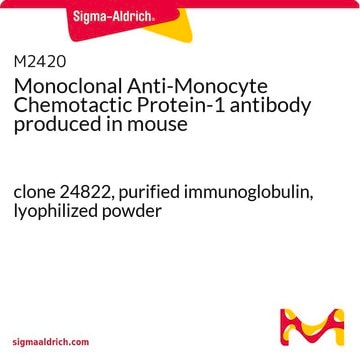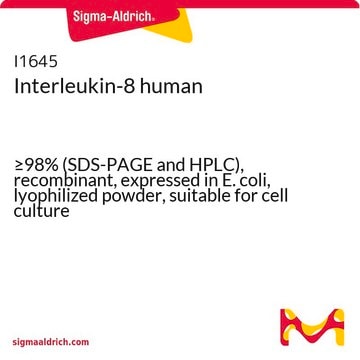M6667
Monocyte Chemotactic Protein-1 human
≥97% (SDS-PAGE and N-terminal analysis), recombinant, expressed in E. coli, lyophilized powder, suitable for cell culture
Synonym(s):
MCP-1
Sign Into View Organizational & Contract Pricing
All Photos(1)
About This Item
Recommended Products
biological source
human
Quality Level
recombinant
expressed in E. coli
Assay
≥97% (SDS-PAGE and N-terminal analysis)
form
lyophilized powder
potency
5-60 ng/mL EC50
mol wt
8.7 kDa
packaging
pkg of 10 μg
technique(s)
cell culture | mammalian: suitable
impurities
endotoxin, tested
UniProt accession no.
storage temp.
−20°C
Gene Information
human ... CCL2(6347)
General description
Monocyte chemoattractant protein-1 (MCP-1) or monocyte chemotactic and activating factor (MCAF) is part of the C-C chemokine family. The gene encoding this protein is localized on human chromosome 17q12.
Application
Monocyte chemotactic protein-1 (MCP-1) has been used to study its effects on the motility of lymphoblastoid cell line NC–NC cells.
Biochem/physiol Actions
The biological activity is measured by its ability to chemoattract BaF3 mouse pro-B cells transfected with human CCR2A. The ED<SUB>50</SUB> for this effect is typically 5-30 ng/mL.
Measured by its ability to chemoattract 2-day cultured human monocytes, Matsushima, K., et al. (1989) J. Exp. Med. 169:1485, the ED<SUB>50</SUB> for this effect is typically 5-20 ng/mL.
Monocyte chemoattractant protein-1 (MCP-1) triggers the activation of monocytes by triggering degranulation as well as respiratory burst activity in monocytes. It facilitates monocytes in inhibiting or enhancing the growth of specific brain tumor cell lines. MCP-1 chemoattracts monocytes, macrophages, T cells and natural killer cells. The protein is overexpressed in atherosclerosis, idiopathic pulmonary fibrosis, rheumatoid arthritis and delayed hypersensitivity reactions. It is also implicated in Kawasaki disease.
Measured by its ability to chemoattract 2-day cultured human monocytes, Matsushima, K., et al. (1989) J. Exp. Med. 169:1485, the ED<SUB>50</SUB> for this effect is typically 5-20 ng/mL.
Monocyte chemoattractant protein-1 (MCP-1) triggers the activation of monocytes by triggering degranulation as well as respiratory burst activity in monocytes. It facilitates monocytes in inhibiting or enhancing the growth of specific brain tumor cell lines. MCP-1 chemoattracts monocytes, macrophages, T cells and natural killer cells. The protein is overexpressed in atherosclerosis, idiopathic pulmonary fibrosis, rheumatoid arthritis and delayed hypersensitivity reactions. It is also implicated in Kawasaki disease.
Physical form
Lyophilized from a 0.2 μm filtered solution in phosphate buffered saline containing 0.5 mg bovine serum albumin.
Storage Class Code
11 - Combustible Solids
WGK
WGK 2
Flash Point(F)
Not applicable
Flash Point(C)
Not applicable
Personal Protective Equipment
dust mask type N95 (US), Eyeshields, Gloves
Choose from one of the most recent versions:
Already Own This Product?
Find documentation for the products that you have recently purchased in the Document Library.
Expression of monocyte chemoattractant protein-1 in Kawasaki disease: the anti-inflammatory effect of gamma globulin therapy.
Asano T and Ogawa S
Scandinavian Journal of Immunology, 51(1), 98-103 (2000)
Interleukin 7 receptor a chain (IL7R) shows allelic and functional association with multiple sclerosis
Simon G Gregory
Nature Genetics, 39(9) (2007)
99mTc-HMPAO labelling inhibits cell motility and cell proliferation and induces apoptosis of NC?NC cells
Mutation Research. Genetic Toxicology and Environmental Mutagenesis, 631(2), 69-76 (2007)
Monocyte Chemoattractant Protein-1 (MCP-1/CCL2) Levels and Its Association with Renal Allograft Rejection.
Raza A
Immunological Investigations, 46(3), 251-262 (2017)
Articles
Lipid Induced Insulin Resistance
Our team of scientists has experience in all areas of research including Life Science, Material Science, Chemical Synthesis, Chromatography, Analytical and many others.
Contact Technical Service








